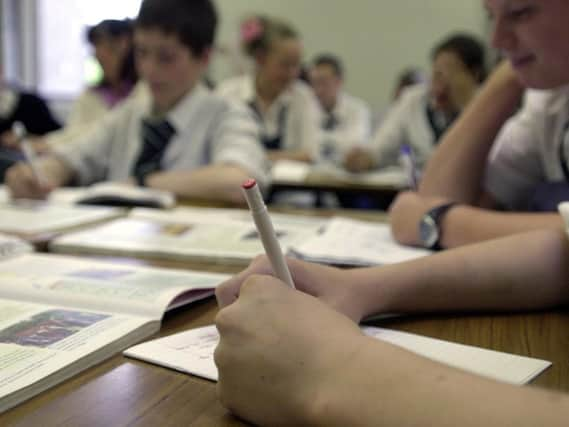Call to address Yorkshire's 'digital divide' in easing inequality ahead of students' return to school


Analysis last year warned of a widening attainment gap in the North between the most disadvantaged pupils and their wealthier peers, with young people in parts of Yorkshire nearly two years behind some of their fellow students by the time they finished their GCSEs.
With school settings preparing for a return to the classroom in coming weeks, governor and national education campaigner Fiona Millar has spoken of the challenges school leaders and headteachers face in attempting to catch up on lost learning and social divides.
Advertisement
Hide AdAdvertisement
Hide AdAs she warns that some form of flexible learning could become a reality in settings for a year or more, she calls for greater urgency in levelling the playing field.
“The whole country has a digital divide, young and old, and this should have been resolved years ago,” she said, warning a mix of blended learning “is going to be the future” until a vaccine is available.
“It’s about closing the digital divide, and ensuring that whatever blended learning happens in the future, that we result in a much more equal society than the one we already have. Our whole education system needs an overhaul. All this situation is doing is exacerbating inequalities.”
A report from the Education Policy Institute (EPI) last year found there had been a “dramatic” slowing down in the closure of the disadvantage gap, warning that progress made was at a turning point of being undone.
Advertisement
Hide AdAdvertisement
Hide AdThe most disadvantaged pupils were, on average, a year and a half behind their wealthier peers and in some areas such as Rotherham nearly two years behind by the time they finished their GCSEs.
Ms Millar said teachers and school leaders face a “difficult” challenge in catching up on lost time, not just in costs to learning but in social and emotional wellbeing and for many who may have barely left their homes for months.
And while some young people will have realised the value of education, there will be others who have had “severe learning loss”.
“There will be, in some cases, a lot of work to be done to support these young people and get them back to where they should be,” she said. “Students respond to teachers they know, but teachers can only be stretched so far.”
Austerity
Advertisement
Hide AdAdvertisement
Hide AdOne of the most divisive challenges has been over delivery of home learning, with many parents pushing for online classes and live-streaming of lessons as some private settings have done.
This would not have been possible in state schooling, Ms Millar warns, serving only to widen the disadvantage. Addressing challenges over laptop provision alone cannot serve as a solution, she said, when there are further complications over austerity.
“The gap had stopped narrowing before Covid,” she warned. “The reason for that is austerity has had a massive impact on certain families. You cannot separate the impact of deprivation on educational outcomes.
“It’s really tragic that so much work has gone on in the last 20 years to shift that gap, and now it’s widening again. Teachers are expected to put everything in society right. We’ve got to get society right as well if we want to narrow these gaps.”
Government response
Advertisement
Hide AdAdvertisement
Hide AdA Department for Education spokesperson said: “Schools and teachers have gone to great lengths over recent months to support and educate children at home and in the classroom.
“In the weeks leading up to the summer holidays we saw up to 1.6m children return to school, and all children will return to school in September as we know that is the best place for their education and wellbeing.
“We have invested over £100m in supporting remote education, alongside the launch of Oak National Academy, which has provided millions of online lessons. Our £1bn Covid catch up fund will also help all children to make up for the impact lost time in school has had on their education.”
_____________________________________________________
Editor’s note: first and foremost - and rarely have I written down these words with more sincerity - I hope this finds you well.
Advertisement
Hide AdAdvertisement
Hide AdAlmost certainly you are here because you value the quality and the integrity of the journalism produced by The Yorkshire Post’s journalists - almost all of which live alongside you in Yorkshire, spending the wages they earn with Yorkshire businesses - who last year took this title to the industry watchdog’s Most Trusted Newspaper in Britain accolade.
And that is why I must make an urgent request of you: as advertising revenue declines, your support becomes evermore crucial to the maintenance of the journalistic standards expected of The Yorkshire Post. If you can, safely, please buy a paper or take up a subscription. We want to continue to make you proud of Yorkshire’s National Newspaper but we are going to need your help.
Postal subscription copies can be ordered by calling 0330 4030066 or by emailing [email protected]. Vouchers, to be exchanged at retail sales outlets - our newsagents need you, too - can be subscribed to by contacting subscriptions on 0330 1235950 or by visiting www.localsubsplus.co.uk where you should select The Yorkshire Post from the list of titles available.
If you want to help right now, download our tablet app from the App / Play Stores. Every contribution you make helps to provide this county with the best regional journalism in the country.
Sincerely. Thank you.
James Mitchinson
Editor